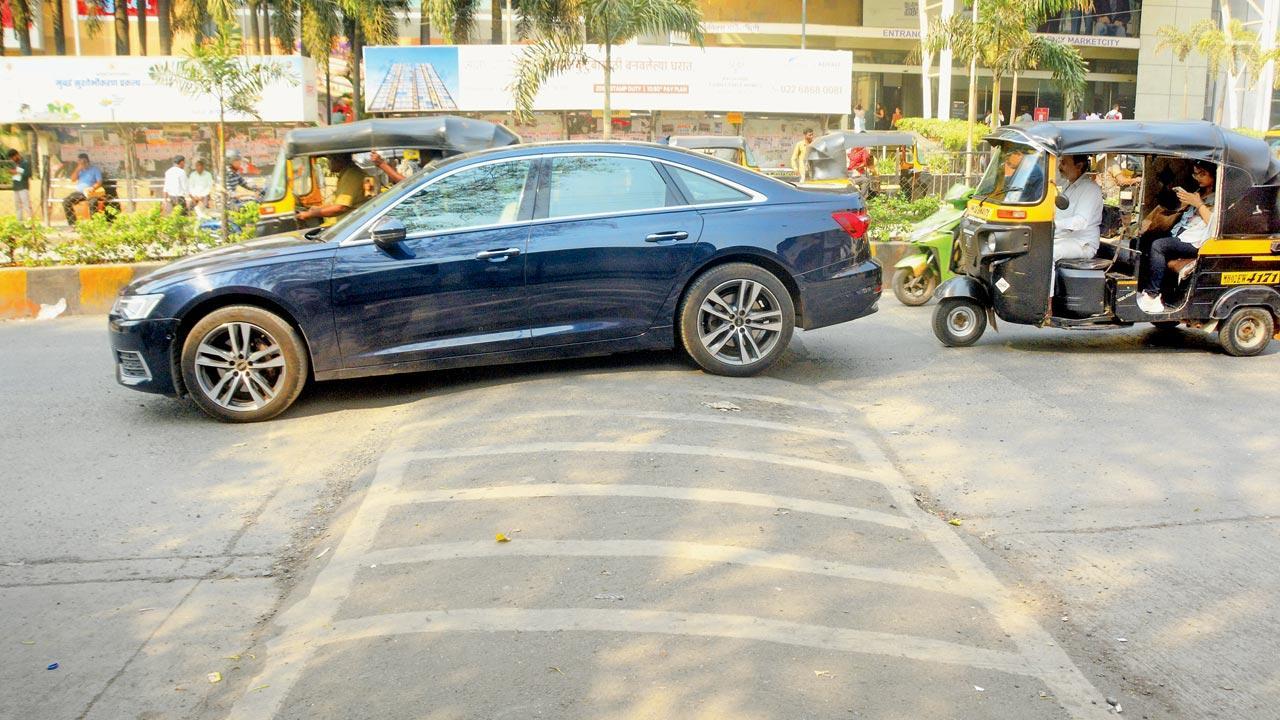Mumbai: Dear BMC, can you give us the right speed bumps?

Recently, a car got stuck on a wide speed breaker in Kurla, which, according to the locals, was not the first such incident. This sparked a conversation about the city’s speed bumps, which residents said and even mid-day saw are uneven and not built as per the government rules.
For instance, there are four speed bumps outside Phoenix Market City on LBS Marg in Kurla, and all are of different widths and heights.
During a visit to the spot, mid-day saw two speed breakers, built 50 metres apart, just before the signal. The road going the other direction, too, has two speed breakers, right in front of the mall.
According to the government’s rules, speed breakers should have a radius of 17 metre, a height of 10 cm and a width of 3.7 metre to maintain a vehicular speed of 25 km/h for general traffic.
Also Read: Mumbai: CSMT’s collapsed bridge will be up next month
The viral incident
A video of a luxury car being pushed off the speed breaker outside Phoenix Market City last week went viral on social media. Umesh Kumar, the owner of a shop located right in front of the spot, said, “Earlier, the speed breaker was low in height. But, the height was increased about six-seven months back. Since then, many vehicles have got stuck here and we have to help the drivers get off. Experienced drivers know how to cross such speed breakers, i.e. diagonally, but the new drivers find it hard to navigate.”
There is a school nearby, maybe that’s why the residents demanded the height to be raised, he said.
Sanjay Singh, a bystander, pointed out, “There is a terrible traffic jam on this road almost round the clock. What is the need to limit the speed of vehicles then?”
Need to follow rules
Rishi Aggarwal, a mobility expert, said the speed breakers are essential for safety purposes. However, there is an absence of uniformity in the design of Mumbai’s speed bumps, he added.
A member of Roads of Mumbai, a community on Twitter that highlights issues related to roads, also pointed this out. “Most of them are so high that it seems more like a car breaker. The majority of speed breakers don’t have reflectors or painted stripes [that are meant to alert the motorists], which makes driving/riding difficult at night. A signboard warning of a speed bump ahead is missing at most places,” he added.
“It’s a shame that India’s financial capital, which has the richest municipal corporation, can’t fix such basic, yet essential things. It also shows how serious they are about the safety of the citizens,” he said.
Many unauthorised bumps
A V Shenoy, senior transport expert with Mumbai Mobility Forum and Mumbai Vikas Samiti, said, “Most speed breakers are unauthorised and provided by local corporators or leaders through their contractors. They may be necessary, but should be built as per the mandated standards. Instead of building a speed breaker that is dangerous for motorists, the authorities should install rumble strips.”
Jitendra Gupta of the Mumbai Transport Forum said, “It seems there is a lack of awareness about how and when a speed breaker can be called unauthorised. Should it not be the BMC’s responsibility to declare which ones are authorised. The public should be informed that any speed breaker built without following the rules of the Indian Roads Congress (IRC) becomes unauthorised.”
He suggests that a separate central body be set up to monitor the implementation of IRC rules, as it is a national document. “This central body can make implementation mandatory by imposing fines on corporations. Unless this happens, BMC would continue to take people for a ride,” Gupta said.
BMCSpeak
An official from BMC’s Roads department said the speed breakers are installed by the local ward offices, many a times on the demand of residents for safety near schools or hospitals. “Accordingly, the ward office takes permission from the traffic police and builds one. It is the duty of the official concerned to check whether it’s made as per the guidelines,” the
official added.
Mahadev Shinde, assistant municipal commissioner, L ward, said, “When we build low speed bumps, residents demand that we raise the height. We do it with the permission of the traffic police. In this particular case [Phoenix], we will inspect the site and act accordingly.”

Atul Tiwari is a seasoned journalist at Mumbai Times, specializing in city news, culture, and human-interest stories. With a knack for uncovering compelling narratives, Atul brings Mumbai’s vibrant spirit to life through his writing.





